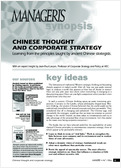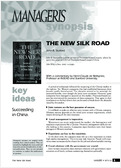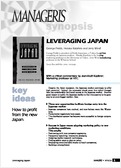China, El Dorado or mirage?

China seems to have everything to attract foreign investors, but the pitfalls are numerous. What lessons can be learned from the experiences of Western companies that have already gained a foothold in the Middle Kingdom?
China is now seen to be a “must” for any company with global ambitions. Besides unbeatable production costs, many experts underline the country’s vertiginous growth rate, the emergence of a middle class eager to consume, the opening of markets following WTO membership and the opportunities created by the 2008 Peking Olympic Games. In this context, it comes as no surprise that the number of foreign companies trying their chances in the Middle Kingdom has never been so great.
Yet, the publications that we have selected tell a different story. Although it is true that China is growing at a frenetic pace and some foreign firms have been successful there, it would be naïve not to point out the great stumbling blocks that continue to exist. Indeed, many joint ventures between Chinese and Western companies have flopped, most foreign companies hardly make a profit on the local market, turnover is high among qualified Chinese workers, patent protection is a major challenge, and protectionism is rampant!
Careful not to paint a picture that is too rosy or too black, our selected publications point out a number of ways for Western companies to maximize their chances of succeeding in China, including the following:
– Be conservative in setting objectives: recognize that foreign companies rarely strike it big in China.
– Anticipate and prepare to run great risks in many areas, e.g. product pirating, supply problems, quality issues, etc.
– Give your Chinese structure sufficient room to adapt to local realities.
SubscriberSign in
to download
the synopse (8 p.)
VisitorI want to buy
this synopsis (8 p.)
VisitorI want
to subscribe
See also

Chinese thought and corporate strategy
The principles behind the thinking of classic Chinese strategists turn out to be surprisingly relevant for coping with today's corporate strategy issues.


![La Chine [China]](images/ouvrages/l/2413.jpg)
![La face cachée de la Chine [The Hidden Face of China]](images/ouvrages/l/2414.jpg)
